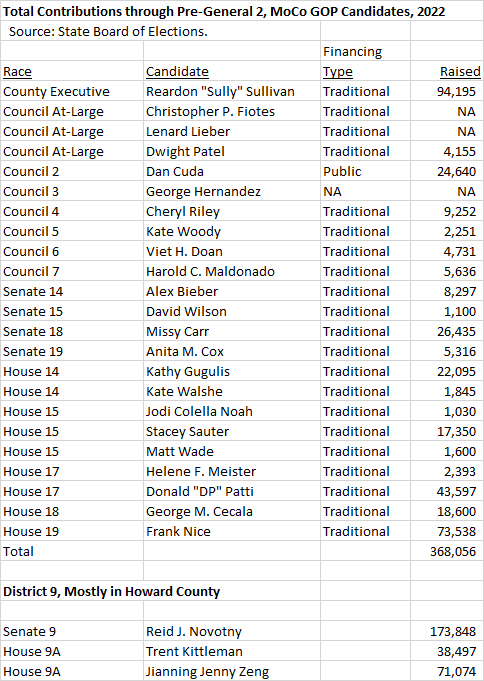By Adam Pagnucco.
I have seen this play out in every election since I first started writing in 2006: MoCo Republican candidates for county executive, county council and the state legislature insist that they can actually win. From a historical perspective, they are not wrong – the county used to elect Republicans to some offices and in 1994, the GOP won a quarter of all partisan elections in MoCo. But since 2006, they have been shut out.
The biggest single problem faced by county Republicans is the ultra-right-wing shift in their national party. Partisan tensions related to former Speaker of the House Newt Gingrich and his lieutenants, Dick Armey and Tom DeLay, helped defeat moderate GOP Congresswoman Connie Morella in 2002. But Gingrich, Armey and DeLay are not in the same league as Donald Trump, who tried to overthrow an election and is now organizing fascists to take over the country. The only chance any Republican would have in this county is to repudiate Trump as Governor Larry Hogan did and spend tons of money to spread that message. There is no evidence that any county Republicans are doing both of those things.
And that brings us to their other big problem: money. No one believes that MoCo Republicans can win so few people give them any meaningful campaign contributions. Even the business community avoids them, preferring to give to moderate Democrats who won’t be with them on everything but at least have a chance of winning office.
The table below shows the sums raised by Montgomery County Republican candidates for county executive, county council, state senate and delegate through the pre-general 2 reports (which apply through October 23). Candidates marked with NA either submitted affidavits that they raised and spent less than $1,000 or did not have a campaign committee that I could find.

The GOP candidates in State Legislative District 9, which is mostly in Howard County, are financially viable. Otherwise, few of the other candidates have the resources to genuinely compete. (The totals for Republican House candidates Donald Patti and Frank Nice are debatable.)
Money was not always a huge problem for MoCo Republicans. In the 2006 cycle, GOP Council Member Howie Denis raised $281,604 for his reelection campaign, which nearly doubled Democratic challenger Roger Berliner’s sum of $143,968. Nevertheless, Denis lost by 12 points and, along with Delegate Jean Cryor, was the last Republican partisan office holder in a district wholly within the county’s boundaries.
What about the Democrats, you might ask? They don’t raise much money in general elections either. That’s true, but here is the thing: they don’t need to. Most of them build their name recognition in competitive primaries and/or through incumbency and most of them hold steep advantages in partisan voter registration. The burden is on the GOP to make their case in an overwhelmingly blue and blue-leaning electorate.
Republicans might be more competitive if they use public financing. In his race for county executive in 2018, Robin Ficker raised $324,113 in public financing. That’s more than three times what this year’s GOP nominee, Reardon Sullivan, has raised so far. Ficker did not come close to winning, and that would have been the case with or without unaffiliated Nancy Floreen in the race, but at least he had money with which to communicate. In district races in the northern and western parts of the county, some GOP candidates might be able to finish respectably with a bit of cash, though Trumpism alone would probably result in their defeat.
In 2018, GOP candidates averaged 26% of the vote in council district races and 19% of the vote in state senate races in which they ran. Their executive candidate, Ficker, got 16% of the vote in a three-way election. The GOP did not bother to run a candidate in one state senate race and three council district races. We shall see if they do any better this year.
